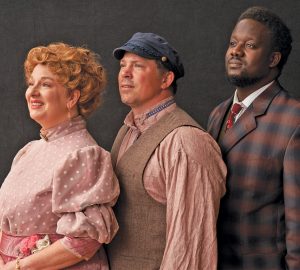The Civil War confirms the observation of one of William Faulkner’s characters that “the past is not even past.” Though we are in the midst of the sesquicentennial observation of that conflict, we don’t need even-numbered anniversary years to reenact its battles or analyze what it means for the character of our country.
Perhaps that’s one reason Matthew Lopez’s The Whipping Man, set in April 1865 in Richmond, Va., has become one of the most-produced plays in American theaters in recent years. In its two hours, three characters, and shrewdly selected Civil War setting, The Whipping Man concentrates and distills the issues of race and religion, dominance and subservience, love and hate that have bedeviled the life of these United and Disordered States from the beginning.
The play has been produced twice in St. Louis: at The Black Rep last spring and at the New Jewish Theatre this winter. It makes sense that both theaters would want to do The Whipping Man. The Black Rep offers plays that relate to the African American experience, and the New Jewish Theatre does plays that relate to the Jewish experience. The Whipping Man does both.
A badly wounded Confederate soldier, Caleb DeLeon, returns to his home in Richmond after the war. At the New Jewish Theatre, Austin Pierce’s performance captured the physical and mental agony of this guarded individual bewildered by the radical changes surrounding him. His formerly magnificent house has been badly damaged in the shelling of the city, and John C. Stark’s set established the mood of the piece in its details of both magnificence and ruin.
Everyone has fled the place except for Simon, once the senior house slave, and John, another former slave—both of whom now, of course, are free men. John and Caleb were childhood buddies, though that became increasingly awkward as they grew up on opposite sides of color lines.
It’s awkward again for Caleb now that John and Simon are no longer slaves and no longer bound to obey his commands.
Gregory Fenner’s exuberant performance conveys the rebellious daring and curiosity that lurked in John even as a slave and earned him trips to the Whipping Man for correction. John “liberates,” as he puts it, food and drink from the neighboring abandoned mansions, searching for items for the seder meal for the first night of Passover; both the DeLeons and their slaves are Jewish.
Celebrating the delivery of the Hebrews from slavery in Egypt must have raised some strange thoughts in the minds of the slaves sitting at the DeLeons’ seder table. But now Simon and John can identify fully with the ancient children of Israel as they celebrate their own freedom. Simon makes the spiritual ‘Go Down, Moses’ part of the Passover ritual.
Illiterate but wise, Simon might strain credulity with some of the skills he’s acquired, like amputating Caleb’s gangrene-infected leg, and with his probing ethical and philosophical musings. But J. Samuel Davis made Simon both admirable and believable. Ron Himes was equally strong in his interpretation of the role at The Black Rep, earning a nomination for outstanding male actor in a drama by the St. Louis Theatre Circle Awards, to be presented March 17 at COCA.
The Whipping Man is a play well worth two productions in any city.
by Bob Wilcox
Photo by John Lamb, new jewish theatre
Pictured: Gregory Fenner, Austin Pierce, J. Samuel Davis








